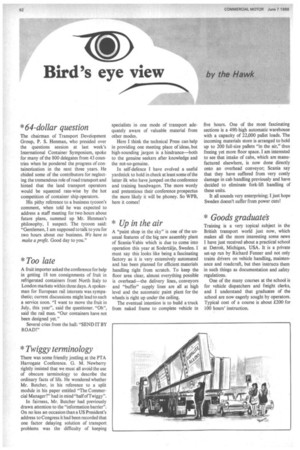Bird's eye view
Page 94

If you've noticed an error in this article please click here to report it so we can fix it.
*64-dollar question
The chairman of Transport Development Group, P. S. Heilman, who presided over the questions session at last week's International Container Symposium, spoke for many of the 800 delegates from 43 countries when he pondered the progress of containerization in the next three years. He chided some of the contributors for neglecting the tremendous role of road transport and hinted that the land transport operators would be squeezed rate-wise by the hot competition of container ship operators.
His pithy reference to a business tycoon's comment, when told he was expected to address a staff meeting for two hours about future plans, summed up Mr. Henman's philosophy, I suspect. The tycoon said: "Gentlemen, I am supposed to talk to you for two hours about our business. We have to make a profit. Good day to you."
*Too late
A fruit importer asked the conference for help in getting 18 ton consignments of fruit in refrigerated containers from North Italy to London markets within three days. A spokesman for European rail interests was sympathetic; current discussions might lead to such a service soon. "I want to move the fruit in July, this year", said the questioner. "Oh", said the rail man. "Our containers have not been designed yet."
Several cries from the hall: "SEND IT BY ROAD!"
*Twiggy terminology
There was some friendly jostling at the PTA Harrogate Conference. G. M. Newberry rightly insisted that we must all avoid the use of obscure terminology to describe the ordinary facts of life. He wondered whether Mr. Butcher, in his reference to a split module in his paper entitled "The Commercial Manager?" had in mind "half ofTwiggy".
In fairness, Mr. Butcher had previously drawn attention to the "information barrier". On no less an occasion than a US President's address to Congress it had been recorded that one factor delaying solution of transport problems was the difficulty of keeping specialists in one mode of transport adequately aware of valuable material from other modes.
Here I think the technical Press can help in providing one meeting place of ideas, but high-sounding jargon is a hindrance—both to the genuine seekers after knowledge and the not-so-genuine.
In self-defence I have evolved a useful yardstick to hold in check at least some of the latter ilk who have jumped on the conference and training bandwagon. The more wordy and pretentious their conference prospectus the more likely it will be phoney. So WPB, here it comes!
* Up in the air
A "paint shop in the sky" is one of the unusual features of the big new assembly plant of Scania-Vabis which is due to come into operation this year at Sodertalje, Sweden. I must say this looks like being a fascinating factory as it is very extensively automated and has been planned for efficient materials handling right from scratch. To keep the floor area clear, almost everything possible is overhead—the delivery lines, conveyors and "buffer" supply lines are all at high level and the automatic paint plant for the wheels is right up under the ceiling.
The eventual intention is to build a truck from naked frame to complete vehicle in five hours. One of the most fascinating sections is a 49ft-high automatic warehouse with a capacity of 22,000 pallet load's. The incoming materials store is arranged to hold up to 200 full-size pallets "in the air," thus freeing yet more floor space. I am interested to see that intake of cabs, which are manufactured elsewhere, is now done directly onto an overhead conveyor; Scania say that they have suffered from very costly damage in cab handling previously and have decided to eliminate fork-lift handling of these units.
It all sounds very enterprising; I just hope Sweden doesn't suffer from power cuts!.
* Goods graduates
Training is a very topical subject in the British transport world just now, which makes all the more interesting some news I have just received about a practical school at Detroit, Michigan, USA. It is a private set-up run by Richard Fenner and not only trains drivers on vehicle handling, maintenance and roadcraft, but then• instructs them in such things as documentation and safety regulations.
One of the many courses at the school is for vehicle dispatchers and freight clerks, and I understand that graduates of the school are now eagerly sought by operators. Typical cost of a course is about £200 for 100 hours' instruction.
















































































































































